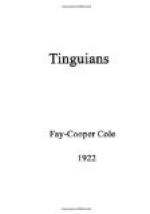When a field has been constructed, or when the terraces are ready to receive the plants, a ceremony known as Dalau, [207] is held. The purpose of this is to secure the good will of the spirits in general, but more particularly to provide a dwelling place for the powerful being Kaiba-an, who guards the crops. A medium, accompanied by the family and any others who may be interested, goes to the field carrying a large bamboo pole, bolo [208] branches, stalks of lono [209] bakon, and saklak. [210] The end of the bamboo is split open, and a saloko [211] is constructed to which are attached the other leaves and stalks. The saloko is then placed on the dividing ridge of the field, and all is ready for the ceremony, unless it is considered wise to also construct a small house (baubauwi). If the field is near the village, the latter is generally dispensed with, but if it is distant, the house is erected so that the spirit will accept it as its dwelling, while it is guarding the crop. It is further explained that the spirit then stays in the small house or saloko instead of in the rice stalks, and so they are able to grow.
A female pig is presented to the medium who, after reciting a proper diam above it, stabs the animal and collects its blood. This is mixed with rice, and a part is at once deposited in the saloko, while the balance is placed on a head-axe, and is carried about the field. When the whole plot has been traversed, this rice and blood is scattered in all directions, while the spirits are besought to come and eat. A part of the company has meanwhile been cooking the flesh of the slain animal, but before any of it is served, a skirt (kinomayan) is spread at the foot of the saloko, and on it are placed dishes of oil and of cooked rice.
After the meal has been eaten, the family gathers up the skirt and dishes, to return them to the village, but the other offerings remain.
Rain, like all other things needed, is sent by Kadaklan or Kaboniyan. If it does not come as desired, or if the crop is not progressing favorably, a ceremony known as Komon or Ubaiya [212] is held. Each person of the village is assessed a sopa of rice, a bundle of palay, or a small coin with which pigs, basi, and other things necessary, can be purchased.
Early in the morning of the appointed day, the mediums, accompanied by many people, go to the guardian stones, oil the head of each, and place a bark band around it. Then having recited a proper diam over a small pig, they slaughter it and scatter its blood mixed with rice among the stones. Likewise they place a dish of basi among them for the use of the spirits. A part of the slain animal is then cooked and eaten, after which all go back to the village. At some appointed place, rice, eggs, betel-nuts, and a large pig have been assembled, and




